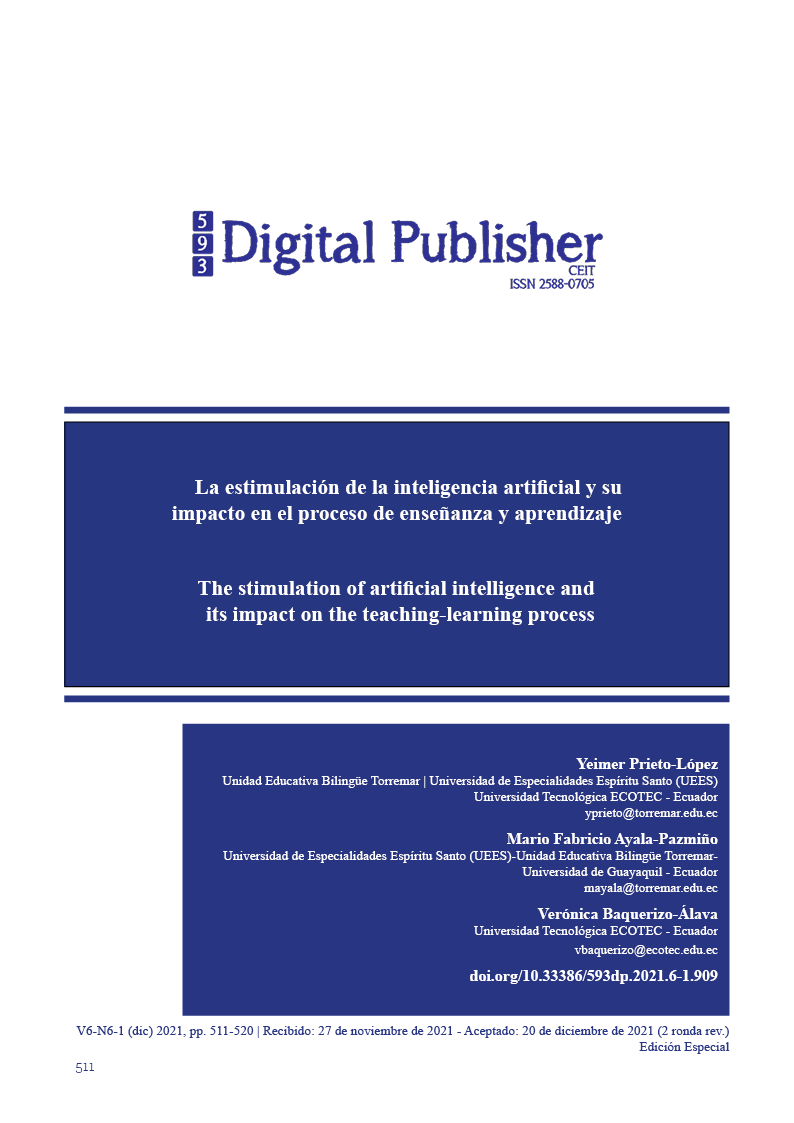The stimulation of artificial intelligence and its impact on the teaching-learning process
Main Article Content
Abstract
Currently, the demands of the modern world calls for teachers to generate an added value for the students to achieve new expertise, enhanced with artificial intelligence (AI), which has become a determining factor as it offers entrepreneurial and managerial advantages and has an impact on the teaching-learning process in any context. As a goal, the researchers intend to contribute with a study of theoretical systematization regarding AI applied to marketing strategies of the Methods of Research subject in the Faculty of Marketing and Communications at Ecotec University. Thus, this work will benefit both the scientific community and the business community as strategical decision-making for customer-oriented publicity is addressed during their preparation and the stimulus of AI is encouraged throughout the completion of the students’ final projects. With this respect, the main theories, emergence, development, tendencies, perspectives, components, and AI technological contributions in marketing have been systematized. Also, books and academic journals such as Scopus,Scielo, Latindex, Redalyc, Dialnet, Web of Science in both English and Spanish were analyzed to provide with current information regarding the investigated variables.
Quantitative research, with non-experimental, transversal design prevailed in the present work. Also, two courses on Methods of Research and one course on Project Research Design, addressing research in AI stimulus are part of the sample. Finally, data collection will be done through a survey using a qustionnaire based on the Linkert scale.
Downloads
Article Details

This work is licensed under a Creative Commons Attribution-NonCommercial-ShareAlike 4.0 International License.
1. Derechos de autor
Las obras que se publican en 593 Digital Publisher CEIT están sujetas a los siguientes términos:
1.1. 593 Digital Publisher CEIT, conserva los derechos patrimoniales (copyright) de las obras publicadas, favorece y permite la reutilización de las mismas bajo la licencia Licencia Creative Commons 4.0 de Reconocimiento-NoComercial-CompartirIgual 4.0, por lo cual se pueden copiar, usar, difundir, transmitir y exponer públicamente, siempre que:
1.1.a. Se cite la autoría y fuente original de su publicación (revista, editorial, URL).
1.1.b. No se usen para fines comerciales u onerosos.
1.1.c. Se mencione la existencia y especificaciones de esta licencia de uso.
References
Arce, J. (2000). Application of Artificial Intelligence in Automated Production Systems. Artificial intelligence, 4(10), 100-110. Meuter, M. L.
Alain, C. (2019). Artificial Intelligence Technologies and their Categories. Efficacy, Efficiency, and Effectiveness. Autor: Julia Máxima Uriarte.
Albrieu, R., Rapetti, M., Brest López, C., Larroulet, P. y Sorrentino, A. (octubre de 2018).
Inteligencia artificial y crecimiento económico. Oportunidades y desafíos para Perú.
Inteligencia Artificial y Crecimiento Económico en América Latina. Buenos Aires: CIPPEC
Arrencibia, A., Febles, J., Castellano, D., & Frómeta, Y. (2017). Grouping of techniques to predict Adverse Drug Reaction. Cuban magazine of medical informatics, 17 (1).
Bonderman, D. (2017). Artificial intelligence in cardiology. Wiener Klinische
Wochenschrift, 129, 866-868. doi:10.1007/s00508-017-1275-y.
Chaundry, V., Gunning D., Lane, C., & Roschelle J. (2019) "Intelligent Learning Technologies: Applications of Artificial Intelligence to Contemporary and Emerging Educational Challenges." Retrieved on 04/28/2020, from http://www.ecured.cu/Inteligencia_artificial
De Wit, H., & P. A. (25 de Marzo de 2020). El impacto del coronavirus en la educación superior. Obtenido de Nexos : https://educacion.nexos.com.mx/?p=2221
Fernández, A. (2019). Artificial intelligence in financial services. Analytical Articles. Economic Bulletin 2/2019. 8.
Hernández, N. (13 de febrero de 2019). Educación 3.0. Obtenido de https://www.educaciontrespuntocero.com/noticias/inteligencia-artificial-en-educacion/
Humberto, J. (2018). El impacto de la robotización y la inteligencia artificial en el comercio
internacional.
Faggella, D. (2019). Machine Learning in Finance – Present and Future Applications.
Recuperado de https://emerj.com/ai-sector-overviews/machine-learning-in-finance/
Forero, T. (19 de Marzo de 2020). Conoce los principales impactos de la inteligencia artificial (IA) en la educación y sus posibilidades futuras. Obtenido de Rockcontent: https://rockcontent.com/es/blog/inteligencia-artificial-en-la-educacion/
García, V., Mora, A., & Ávila, J. (22 de Enero de 2021). La inteligencia artificial en la educación. Obtenido de Polo del Conocimiento: https://polodelconocimiento.com/ojs/index.php/es/article/view/1762
García, V., Mora, A., & Ávila, J. (22 de Enero de 2021). La inteligencia artificial en la educación. Obtenido de Polo del Conocimiento: https://polodelconocimiento.com/ojs/index.php/es/article/view/1762
Gochez, A. (2008). Concepto, Características y Metodologías de La Inteligencia Artificial.
Recuperado de http://inteligenciaartificialudb.blogspot.com/2008/01/conceptocaractersticas-
y-metodologas.html
Goldfarb, A., Trefler, D. (2018). ¿Cómo afecta la Inteligencia Artificial al Comercio
Internacional?
González, L. (2019). Machine Learning con Python: Aprendizaje Supervisado good-innovation.
Máxima, J. (2019). Inteligencia Artificial, características. Recuperado de https://www.caracteristicas.co/inteligencia-artificial/
Mejía, Z. (2018). Los robots y la inteligencia artificial. Recuperado de
https://www.roastbrief.com.mx/2018/09/los-robots-y-la-inteligencia-artificial/
Ministerio de Comercio Exterior y Turismo. Empresas son reconocidas con premio Perú
exporta servicios. Recuperado de https://www.mincetur.gob.pe/empresas-sonreconocidas-
con-premio-peru-exporta-servicios/
Molina, M. (2018). La Inteligencia Artificial toma las riendas de la logística. Recuperado de
Nanalyze (2017). 10 Artificial Intelligence Startups in Insurance. Recuperado de
https://www.nanalyze.com/2017/05/10-artificial-intelligence-startups-insurance/
Peña, C. (2017). Inteligencia Artificial. El Comercio y los robots.
Rodríguez, G. L., & Brito, S. V. (2017). La Inteligencia artificial en la educación superior. Innova Research Journal, 415-420.
Saavedra, B. (2018). Empresas peruanas de exportación de servicios son premiadas por
Promperú. Recuperado de https://infomercado.pe/empresas-peruanas-de-exportacion-deservicios-son-premiadas-por-promperu/
Seamans, Robert. Artificial Intelligence and Big Data: Good for Innovation?
Tamayo, M. (2007). Tipos de Investigación.
Thompson, I. (2008). Definición de Eficiencia. Recuperado de
https://www.promonegocios.net/administracion/definicion-eficiencia.html
Valdeolmillos, C. (2018). Las 5 características de la Inteligencia Artificial útil, según IBM.
Recuperado de https://www.muycomputerpro.com/2018/04/23/caracteristicas-inteligenciaartificial-util.
Taylor, E. (2016). Mobile payment technologies in retail: a review of potential benefits and risks. International Journal of Retail and Distribution Management, 44(2), 159-177.
WorkMeter (2014). Eficiencia empresarial: secretos de una empresa eficiente. Recuperado
de https://es.workmeter.com/blog/bid/353268/eficiencia-empresarial-secretos-de-unaempresa-eficiente.
Zhang, G., Hu, M. Y., Patuwo, B. E., & Indro, D. C. (2018). Artificial neural networks in bankruptcy prediction: general framework and cross-validation analysis. European Journal of Operational Research, 116(1), 16-32.




